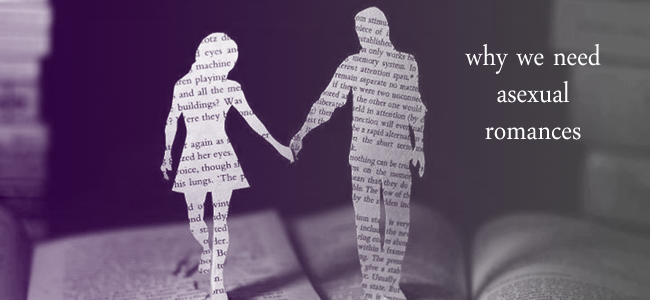
I’ve been thinking lately about asexual romances, and having asexual characters in fiction. After writing about the discrimination that the asexual community faces, and the reactions from allosexual people when they encounter a fictional ace character, I realized something:
Asexual romances are necessary. In fact, they’re essential to maintain the balance in romance genre.
No, wait, hear me out. You’re thinking, “But I don’t want to read a book about two friends who don’t do anything for 250 pages. That sounds boring!”
But not only does that thought process slight the asexual community… there may already be more asexual characters and romances than you know about.
There are two reasons we need asexual characters and relationships in our books.
1. Human sexuality is a spectrum. The romance genre is, for the most part, centered on the spectrum, in the range of ‘average sexual attraction’ for a ‘typical’ relationship. But there are erotica novels. Lots of them, in fact. Books with only sex, and no plot. Books that are textual porn. Books with sex addicts and promiscuity galore. So we should have books on the opposite end of the spectrum as well, right?
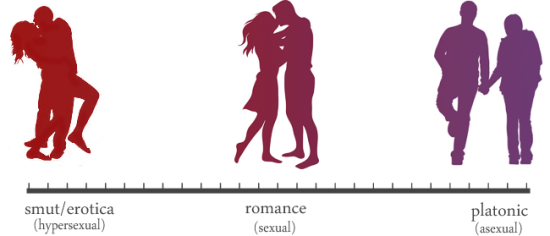
2. The romance genre is defined by a few very specific things. Per the RWA (one of the preeminent authorities on romance, I’d say), a romance novel must contain two things: “a central love story and an emotionally satisfying and optimistic ending.” (Source). And many asexual people are capable of both of those things.
How many times have you read a book with tons of smut and thought “okay, but what about the relationship?” or “I don’t get how they say they’re in love, all they do is have sex!” A lot of romance novels lean on sex as a way to build a romantic relationship, and therefore skimp on the actual romance and relationship.
So let’s look at sexual attraction.
I really like the red-purple scale for explaining levels of sexual attraction, although I understand that it’s not a perfect model. Using this, the above scale would go from F on the left to B on right, with most romance novels falling on E. What’s interesting with this scale, though, is that it’s very much at odds with the distribution of romance novels published!
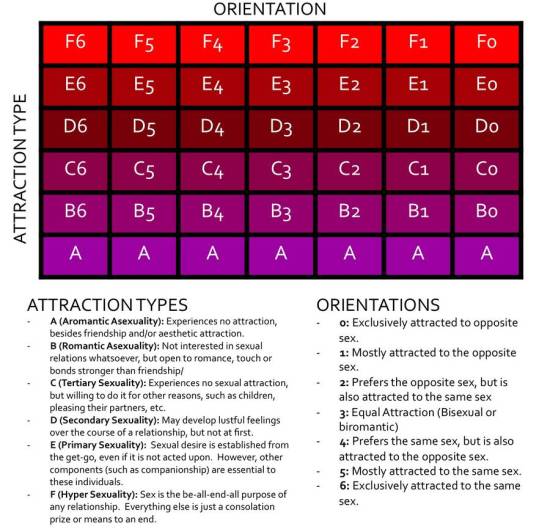
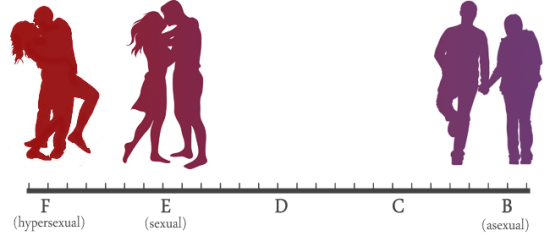
So why not have a romance novel with no sexual attraction? We read YA novels with romances (and no sex) and we enjoy them (well, I assume we do judging by how many people buy them!). And there is clearly a call for adult romance books without any sex in them! Sites like Smart Bitches, Trashy Books, Goodreads, and The Regency Reader have all taken the time to create lists with sex-free romances… and those are just the first few Google results!
The number of books with actual asexual characters or relationships, however, is disappointingly thin. Most of them are found in the LGBT+ subgenre. Considering asexuality is now included in the alphabet soup (LGBTQIA+), and many ace people consider themselves queer, this makes sense. And yet, as I said in my previous post, there’s a lot of backlash about asexuality.
Moreover, of all the sexual minority groups studied, asexuals were the most dehumanized (i.e., represented as “less human”). Intriguingly, heterosexuals dehumanized asexuals in two ways. Given their lack of sexual interest, widely considered a universal interest, it might not surprise you to learn that asexuals were characterized as “machine-like” (i.e., mechanistically dehumanized). But, oddly enough, asexuals were also seen as “animal-like” (i.e., animalistically dehumanized). (Source)
What scares people about asexuality? Why is the word almost a curse word in the romance genre? I think it boils down to one misconception:
Most people associate romance with sex. They think sexual attraction is romantic attraction, and vice versa. And while studies have shown that this is not true (American Psychological Association, Feb. 2007), the majority of people don’t separate the two.
“What turns you on physically is not necessarily what turns you on romantically,” she says.
Maybe we need to explain what asexuality is, then. Every asexual person defines the word differently, but in short it’s a lack of sexual attraction. Some people are also aromantic (A on the red-purple scale), meaning they experience no romantic attraction either. For the purpose of this post, I’m focusing on romantic asexuals (hence the lack of A on the above spectrum, since we’re talking about romance novels).
Your hetero- or homosexuality is not the same as your neighbor’s, right? You’re sexually attracted to brunettes, or people with muscles, or women with long legs. Asexuals are not sexually attracted to anyone, full stop. But many of us are romantically attracted to blondes or skinny people or men with tattoos! Aces can experience attraction, can have romantic feelings towards people. Just like a homosexual person may not be able to comprehend sexual attraction to someone of the opposite gender, an asexual person doesn’t do sexual attraction to any gender.
In short: Aesthetic attraction is different from romantic attraction is different from sexual attraction.
There’s also a middle ground between asexual and allosexual: Gray-aces, who sometimes experience sexual attraction, and Demisexuals, who only experience sexual attraction after forming an emotional bond.
If I really wanted to rile people up, I’d suggest that demisexuality is actually INCREDIBLY prominent in the romance genre! Actually, screw it, I’ll say it! Think about this: how many romance novels are there where the protagonist is utterly uninterested in dating or having sex (and may even be a virgin) until they find “the one”, and form an emotional relationship before finally having sex? (If that plot line sounds like something you’ve read, but the idea of asexuality in romance weirds you out, then you need to take a step back and reevaluate.)
Not only do novels feature demisexuals more frequently than you might think, but authors purposefully write characters to fit that orientation!


Asexual relationships are essential in our romance novels. Not only do asexuals make up tens of millions of people (approximately 70 million worldwide, although it’s widely assumed this is a low estimate), but allosexual people (ie, people who experience sexual attraction) can also enjoy relationship-centric novels with no sex. The newly-established “Proper Romance” subgenre is evidence of that.
It’s worth noting that, while there might be a religious component to some of the Romance books, more and more purchasers of general Young Adult titles, both retailers and librarians, are seeking “No-Sex” Romances. Again, as with Romance, numbers here are impressive: The Association of American Publishers reports that the Young Adult category saw a 61.9% increase in sales from 2010 to 2011, and in 2012, eBooks in the combined Children’s/YA category saw a 475% increase. (Source)
Romance without sex is everywhere. From Jane Austen to contemporary Amish and Christian, to the young adult genre, romance without sex can be found on the shelves of every bookstore and library. But take it one step further, and suddenly everyone balks. We can have books without sex, but not without the off-screen possibility of sex. We can have books without sex, but not without sexual attraction. Why?
One of the things I see over and over again on asexual forums is how difficult it is to be asexual, given how hyper-sexualized society is. And the romance genre only reinforces the stereotype that sex is an integral part of romance. The imbalance in published novels is slowly shifting, as more publishers seek sex-free romances, but asexuality is still seen as taboo.
The fact is that asexual characters may be more prevalent than most people believe, but authors are hesitant to use the dreaded “a”-word for fear of alienating readers, being told they’ve “ruined” the book or made it “boring”, or being accused of “making things up” by people who equate asexuality with Santa Claus.
Examples of characters that are asexual/suspected to be asexual include Sherlock Holmes (Sherlock Holmes Mysteries/BBC Sherlock), Bilbo Baggins (The Hobbit), Dexter (Dexter), Ariadne (Inception), Sheldon Cooper (The Big Bang Theory), and the Doctor (Doctor Who) (AVEN Wiki). Many of them show asexual tendencies, such as not being interested in romantic and/or sexual gestures
(See also: the incredibly short Confirmed Fictional Asexual Characters list on Goodreads.)
Of course, the sheer number of people who cannot see Sherlock Holmes or Biblo Baggins as asexual characters– and who turn to fan fiction to find sexualized versions of these characters– is staggering, but that’s for another post.
We need asexual relationships in our romances. In fact, we may already have them, but we hesitate to use the word ‘asexual’ to describe them. But asexuality is real, and it’s all around us. The current romance novel publications don’t reflect the human sexuality spectrum accurately. In fact, the hypersexualization of romance novels today may even be changing the definition of the romance genre!
If you look at the average level of sexual content in romance for each of the three years before the success of Fifty Shades of Grey, and compare them to the average for each of the years after it came out, I bet a relatively nice dinner sometime down the road that there’s a measurable uptake in sexual content across the industry.
Asexuality doesn’t mean boring, and it doesn’t mean romance is impossible. There’s an audience for romance novels without sex, and asexual characters can and should be written to fill that need. Erotic and platonic romances are the balances on either end of the spectrum, and the genre should reflect that, or risk tipping to one side and changing our understand of romance in the future.
Sources & Links in this post:
I have a reference post listing 2016 book releases with asexual characters here:
Is Fifty Shades of Grey Literally Making Romance Sexier?
Romance Novels Without the Sex – Huffington Post
Asexuality: The Serious Stuff – Almost 1998
What’s Your True Sexual Orientation?
You can also read my post about the perception of asexuality here: The Mythical Unicorn of LGBTQIA Novels
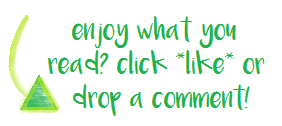
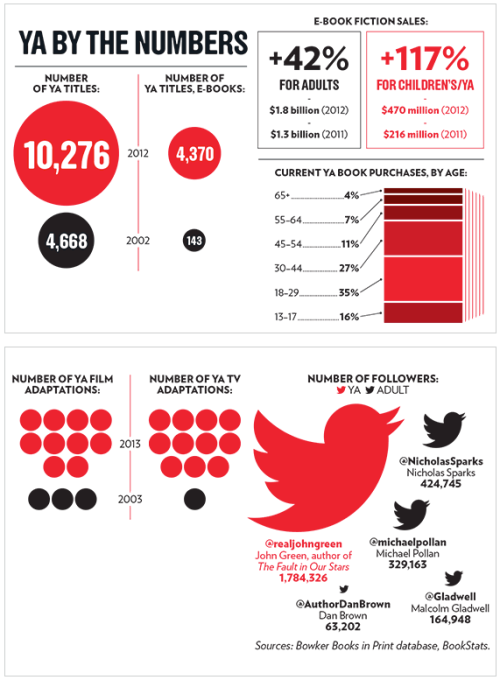
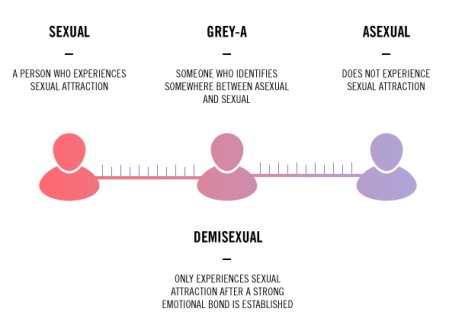
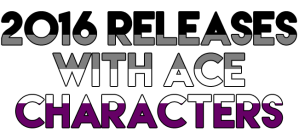
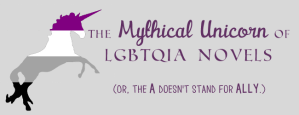
I could not agree more with you though I don’t care for the purple-red scale as it neglects genders outside of the binary.
I myself write mostly asexual and demisexual characters, even in my fanfiction. I know quite a few authors who write Regency romance and by definition it CANNOT have any sex in it. Yet people see the genre label ‘romance’ and automatically assume it must have sex of some kind in it. I think too often people get used to the idea that in entertainment sex is going to be the basis or the relationship. In the real world sex based relationships rarely last. Sex is not the only form of intimacy we as humans are capable. I’ve discussed non-sexual intimacies several times on my blog, ironically while discussing Transformers and how their relationships are approached (guess what – they have intimate relationships).
In my upcoming steampunk novel, one of the main characters is both genderfluid and demisexual while the other is a panromantic bisexual. Spoiler: there is no sex in the book but there is a definite romance.
I would really like to see more romance novels that are more deliberate about their character’s sexuality. I had someone ask me why I felt the need to label myself (I’m nonbinary panromantic demisexual). My reply was that it’s not so much a label as a genre, there’s a lot of variety within the label but at least when I meet someone who has also chosen labels for themselves then I know how they see themselves and can hopefully better relate to them. It’s the same with characters, I would like to know without having to read the subtext how they identify.
Sorry this got long and a bit ranty ><
LikeLiked by 3 people
I’m pretty sure I have hearts in my eyes from your comment. YES YES and also YES!
I agree with you about the red-purple scale. It’s definitely not perfect, and I wish there was a model that could factor in sexual attraction, gender identity, and orientation (although until we get 3D hologram computers, that might be difficult… COME ON, FUTURE!)
I’ve been having a long-running discussion with Daniela at Books To Get Lost In about asexual romances, and I learned last week during a twitter discussion that there’s actually a potential audience for a BDSM Asexual romance… a genre that most people equate with erotica! So yeah, people definitely want the companionship and the close, personal connection too… not just the sex!
I am super interested in hearing more about your upcoming book! Also, I would have sworn that I was following your blog already, but apparently not? SO SORRY *hides* Fixed now.
Labels are definitely super important, in my opinion. I know a lot of people don’t like to label themselves, but I see labels as a way to educate. By saying “I am a panromantic, sex-positive asexual”, I’m telling people around me that there’s more to sexual and romantic attraction than they think. It helps open dialogue. And yes, it makes it MUCH easier to relate to others. But mostly, it’s nice to have a word to identify myself with, other than “weird” or “freak” or “broken”.
LikeLiked by 1 person
Absolutely! No one should have to resort to saying ‘well I’m just weird’ ever. This is why I am trying to help other authors be more inclusive and diverse in their writing. It’s a great way to normalize the terms and help readers realize there is soooo much more to romance.
And I’m totally flailing over here, no need to apologize AT ALL!!! ^_^
LikeLike
I’m actually working on a similar solution to this problem since I’m tired of waiting for a novel which may or may not include an asexual character (who will definitely discover in some sequel that he or she can be sexually attracted to someone). So I decided to work on a novel on my own in which I’ll have at least two characters who are JUST NOT INTERESTED in sex! And I really hope that EVERYBODY will feel threatened by them 😀
LikeLiked by 2 people
Yes! Write more ace romances! And then come tell me all about it so I can read it 😀
LikeLike
Hehe I will do so, but you’ll have to wait until the English version exists, because by now it’s written in …. GERMAN! :O
LikeLike
Crap! *begins learning German immediately*
LikeLike
*blushes* hehe good luck (= “viel Glück” in German 😉 )
LikeLike
I do! Plenty of asexuals in the cuilverse, and not just lgbt ones. In fact, I’m the only one including the entire spectrum of that alphabet soup, even aromantics, as people!
https://www.smashwords.com/books/byseries/4181
LikeLiked by 1 person
I also don’t like eBay scale; it lumps aros and aces together.
LikeLiked by 1 person
*that, not eBay. Not sure how autocorrect got that.
LikeLike
It’s definitely not a perfect representation, but it’s the best that I’ve managed to find. If you know of something better, I’d really love to know about it!
LikeLiked by 1 person
I’m working on one, actually. I’ll definitely share it when it’s done. 😀
LikeLiked by 1 person
Yes to this post!
And really, why has sex to be every-fucking-where?! It’s like no genre is safe from it?
I’m not saying that there should be no sex at all, but why “every” book? That being said, why has there to be love everywhere? If you’re reading a crime novel with a male detective/cop/etc you know as soon as there is a female character (who is always really good looking), they fall in love. But that’s another topic.
So back to ace characters. I don’t understand why people feel threatened by them. And I sure as hell don’t understand why they need the idea of possible sex later to believe a romantic relationship. Society is weird and it needs to be educated.
LikeLiked by 2 people
I think society these days is telling us that sex and relationships are tied together, almost the same thing. We tell women who have sex without a relationship that they’re sluts, and therefore link the two together even more. So the romance genre is starting to reflect that more and more, as romance novels become more steamy. When I was younger, reading a Harlequin was very taboo, because it had sex in it and that wasn’t “polite”. But now people read 50SOG on the bus and no one cares. I don’t think we need to return to the “good old days”, but I do think society needs to take a step back and remember that romance doesn’t mean sex.
I am DEFINITELY getting sick of every book/TV show/movie having romance in it. And things are changing slowly… we have Pacific Rim, and the new Star Wars, which feature male and female co-leads who are not in relationships.
LikeLiked by 2 people
I still haven’t seen Star wars 😦 But I truly have to because the more I hear about it the greater it sounds.
Here’s to hoping for a change in media.
LikeLike
Pingback: Going Over the Rainbow: Show and Tell | Bran Lindy Ayres
Good article. In response to your question, I got this link from the Facebook page Asexual ACES. Right now it has 152 likes and 54 shares. 🙂
LikeLiked by 1 person
Thank you so much Emerson! I was so curious because it was so sudden! I appreciate it (and hurrah, a new Facebook group for me to check out!)
LikeLike
Fascinating article. As someone who found this on a fb writing group (Nanowrimo’s group – that still probably where the traffic spiked from) it makes me wonder about how I could incorporate this into a future YA book.
LikeLiked by 1 person
Ah thank you for letting me know! I’d love to see more ace characters in YA as well. If I’d had an asexual character in a book when I was a teenager, I suspect I would have saved a lot of years of confusion and doubt, wondering what was “wrong” with me!
LikeLike
I got here from the “Asexual Aces” FB community page. I haven’t checked yet but you might be circling around in all the ace pages and groups, lol. I really appreciated and agree with this post. Thank you for your support. 🙂
On the occasions I find a romance that isn’t sappy or fraught with sex or disguised mental abuse, it’s a good thing.
These days I find myself more often on the treasure hunt for a good “bromance” (regardless of the characters’ genders). I think those are as equally hard to find, if not harder. I digress, though.
Again, thanks for the support. 😁
LikeLiked by 2 people
Thank you for reading!
I’m asexual myself, and although I consider myself sex-positive and love reading books with sex in them, it’s just really nice sometimes to have characters that I can relate to. Because as much as I enjoy reading the sex, on a fundamental level I can’t understand the sexual attraction.
I would LOVE some good bromance (or girlmance?) books! You’re right, I suspect those are way harder to find. Any recs to share?
LikeLike
Like a few people in the comment here, I came here from “Asexual ACES” on Facebook.
To be honest, I find at the moment that I feel like ‘that person’ whenever I share some incredibly valid points in a post about asexuality.
“There she goes, talking about sexualities again.”
Problem is, if I don’t help to raise awareness of definitions, of the repression of asexuals and other non-binary people, then who will?
This is why including sexualities in literature is very important. And no, I don’t just mean that one homosexual character in the whole book. Sometimes, I feel like they do this in the same way they have to add one black person into movies and tv shows so they aren’t rasist. Lets add a non-straight person into it to show we do support the LGBT community! What sexuality should this one singular person be? Oh, homosexual of course, because there are no other sexualities that aren’t straight!
I find it great that homosexuality has become more of a social norm – and dont get me wrong, I do love those gay characters – but I think the rest of us needs to get a bit of recognition too. And maybe add in more than one gay person; there are countless straight girls and guys that are just friends in books, so why not two gay guys in a bromance? Or two pan’s? Or a demi and a bi?
I think part of the problem is that when a sexuality is actually mentioned instead of hinted at, people assume that person is then going to attack the next person who matches their attraction with their genitals. Which is probably why when asexuality is mentioned people start booing because they didn’t get their expected lustful gratification from the piece, even if that would just be very sexualised kissing.
Me? I am a heteroromantic, sex-positive autochorissexual, and I do like to read erotica when I feel like it, but the story behind it is usually a big part of it for me.
But I do think everything is oversexualised and would absolutely enjoy a story with just romance (though I am not partial to the romance genre much; I just prefer fantasy or Sci-Fi) or no romance at all, even if the characters are actually mentioned being some type of allosexual.
In fact, I have a novel in the planning stage (lets hope it won’t stay there, knowing me!) where I am planning on making the main character asexual, have clinical depression. Not to make an ‘interesting’ character, but for representation and hopefully to spread understanding of both of those.
I know how hard it is to explain non-binary concepts to people who only know of three catagories; gay, bi or straight – red, blue or yellow. It is so hard trying to explain orange or green to them, because they can only see the primary colours.
And that doesn’t help those who are young and just figuring themselves out.
I was lucky that I was found information on asexuality and actually read it. Before, I’d just accepted that I was weird. I was told that I would feel confused when I looked at the same gender and felt things I didnt with the sane gender, so I spent most of my days studying people and being more confused that I felt no confusion, but nothing for the same sex either. I didn’t know what to do about relationships, so I let people be the ones to come to me if they were interested. I was just used to being different in this one aspect and had accepted it in such a way that I never questioned it. But, at that point, I only knew of gay or straight, and I was constantly trying to figure out which I was, though I had accepted that I wasn’t really attracted to either, just so I could fall in a catagory. Then I found asexuality and, I won’t lie, it took a while to come to terms with it, as I had already accepted myself as something else. But now I am much happier with myself.
That last part wasn’t even a full year ago, and I am 19.
Homosexuality has a lot of representation in media so they can immediately feel comfortable with themselves, and that is fantastic.
But the rest of us don’t.
We really need it.
Not just to help those who are non-binary, but to help the people who arent to understand and accept them.
We need asexuals in novels.
LikeLiked by 1 person
Thank you so much for your fantastic comment! I absolutely agree! For me, it boils down to one very simple thing: representation. Growing up, in high school and college, I thought there was something wrong with me because I didn’t want to have sex like all of my classmates and friends. It just didn’t interest me. If I’d had an ace character to read about at age 18, it would have changed my entire life.
I know people get sick of hearing about it, but I think that just makes me want to talk about it even more. Because we need to get to the point where everyone understands and accepts that there’s a spectrum of sexualities and genders out there, and talking about it is the best way to do that.
❤
LikeLike
Pingback: Reference Post: 2016 Releases with Ace Characters | Just Love: Romance Novel Reviews
Pingback: The Mythical Unicorn of LGBTQIA Novels (Or, the A doesn’t stand for Ally.) | Just Love: Romance Novel Reviews
Why are all the silhouettes in this post generic male/female figures?
LikeLike
1. Because I’m trying to prove a very simple point to a mostly cis-get readership, and felt that including non-binary and genderqueer deviated from the point I wished to make.
2. Because unfortunately we still live in a world locked in by notions of only two genders, and therefore finding silhouettes of NB/GQ persons is extremely difficult.
3. Because the graphics should honestly be the least important part of this entire essay.
4. Because this is an essay about aexuality, not gender, and I repeat the point from #1.
5. Because we live in a world where people feel the need to ask questions like this anonymously on the Internet, and I repeat the point in #2.
Thank you for your comment.
LikeLike
Pingback: Going Over the Rainbow: Aromantic | Bran Lindy Ayres
This is such an amazing article. As an asexual author who is currently writing up the manuscript for an asexual Regency Romance novel, you’ve tackled every single reason why I’m writing the book, except for two or three that are more self-fulfilling than anything. More books should have asexual readers in mind, just like more books should have aromantic readers in mind. Everyone deserves to find a book that they can pick up and read without finding it too far on one spectrum or another.
Thank you for bringing it up, and for cementing my idea to get this book on shelves.
LikeLiked by 1 person
Thank you so much! I’m a big supporter of ace characters in romance, and I hope someday you have a book out with an ace character to add to the slowly-growing list!!
LikeLiked by 1 person
Bless this post, I love it so much!
As part of the a-team myself I have struggled with making romances progress into sexual desire and this post is just beautiful!
LikeLike
Asexuality is not real, it’s a low sex drive, but otherwise I agree I don’t want to read about sex in everything I read.
LikeLike
Hi Judith. As someone who IS asexual, writing to someone who is apparently not, I’m going to state calmly that you are incorrect and you have been misinformed. Asexuality is real, and is not simply a “low sex drive”. While you may of course choose to continue your life believing that this is the case, I would request that you not casually invade someone’s life and declare their identity to be invalid simply because it is not an identity with which you subscribe. Thank you for your comment.
LikeLike
Thank you for stating this. I’m asexual as well and I can absolutely NOT understand how someone could just think that Asexuality does not exist. I don’t have a “low sex drive”, I’m plainly not interested in sex and/or anything that has to do with sex. I don’t need sex in a relationship with a person, I need a mental connection.
Again, thank you.
LikeLike
Pingback: Finding Your Feet : asexualité en romance et « prude-shaming » | Romanceville
I don’t know how I got here XD but cool nice article
LikeLike
Hey,
thanks for this article. Still true, that we need more ace characters and more ace romance. To be honest, I’m not sure if we already have any. Because I got here googling for exactly that. On the Goodreads shelve there are mostly novels where they are just too young or too unexperienced (or simply too busy saving the world) to have sex. Though that is a welcome variety, it’s just not the same as actually dealing with asexuality. I’m ace myself and I found that saying so is usually the end of all flirts. People just back away. And in none of the novels it’s really a topic. They just don’t have sex, but that’s what happens to sexual people as well that they wait for a while when they get together. (Unless they are hypersexual as in your table.)
So I really would love getting real ace romance novels. (I wonder why they don’t write them in the fantasy or SciFi genre, as it might be easier to simply have an ace species falling in love with a human. This way one could get a foot in the door for ace representation.)
Well, anyway, thank you for this post. Truly.
LikeLike
Reblogged this on Site Title.
LikeLike
Pingback: https://justlovereviews.com/2016/01/15/asexual-romances-are-necessary/ – Site Title
Pingback: Episode 92: We Need Inclusive Romance! | Bellwether Friends
Pingback: Asexual Romances | Couples Counseling in Portland